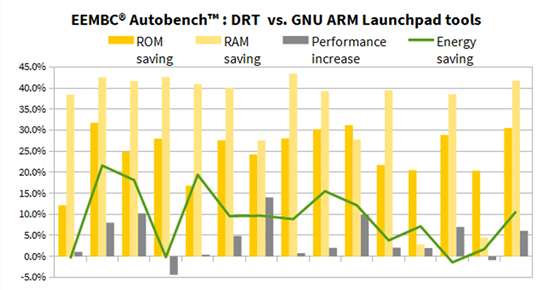EEMBC benches used to validate MCU development environment
Somnium is a member of the Embedded Microprocessor Benchmark Consortium (EEMBC) Automotive Subcommittee, and uses EEMBC Autobench and EEMBC EnergyBench to validate its Device-aware Resequencing Tools (DRT) solution, a complete software development environment for Freescale's Kinetis series of low power 32-bit automotive MCUs.
Comparing against the GNU ARM Launchpad tools (widely used in other free and commercial software tools products) shows that DRT can enable performance increases of over 10% with energy reductions of up to 20%, whilst also reducing usage of precious on-chip RAM and ROM by up to 40%, according to Somnium. No source code changes are required, meaning that using DRT simply provides better results, automatically.
In addition to these industry standard EEMBC benchmarks, DRT's GNU and Eclipse compatibility allows Somnium to test with Freescale's software enablement solutions, including Kinetis SDK, the Sensor Fusion Toolbox and demonstration applications from Freescale’s online community. Using unmodified source code and identical compiler options, DRT provides significant savings for precious on-chip ROM and RAM resources, whilst maintaining system performance. These savings are achieved automatically, enabling use of lower-priced Kinetis devices and reducing development costs.

EEMBC Autobench: DRT vs GNU ARM Launchpad tools
DRT also provides full Newlib functionality and performance within the memory profile of the simpler Newlib Nano configuration, and contains advanced optimisation to remove unused code and data. This dramatically reduces memory overheads, allowing more of the precious on-chip ROM and RAM resources to be used for application software. DRT’s optimisations are critical to enabling the use of cost optimised Kinetis devices for embedded designs.
Unlike other commercial tools, DRT combines a familiar UI and compatibility with Freescale’s Kinetis Design Studio SDK and CodeWarrior for Kinetis MCUs together with Somnium’s patented technologies to automatically provide the best quality code generation, saving development costs and generating the best possible technical results. DRT’s code generation tools are aware of the coupling of the memory system to the processor and automatically applies a patented series of optimisations. This makes the programme dramatically smaller, faster and energy efficient whilst also saving significant development time and money. Developers using Somnium’s DRT products will have a significant advantage over their competitors, reaching the market faster with more efficient and more profitable designs.
“This first set of results is truly impressive,” said Markus Levy, President, EEMBC. “Autobench testing using Somnium’s DRT breakthrough technology in comparison with similar software tools has shown that significant energy and code size reductions can be achieved whilst maintaining performance and without any source code changes. We are working with Somnium to release additional EEMBC benchmark results, including ULPBench and CoreMark in the coming months”.
“DRT’s patented resequencing automatically optimises memory and energy usage, whilst also improving performance. DRT’s out-of-box solution is fully compatible with the most widely used industry standard software tools, with no source code changes required. Working with EEMBC has enabled us to clearly demonstrate DRT’s benefits using well respected, industry standard benchmarks,” added Dave Edwards, CEO and CTO, Somnium.





